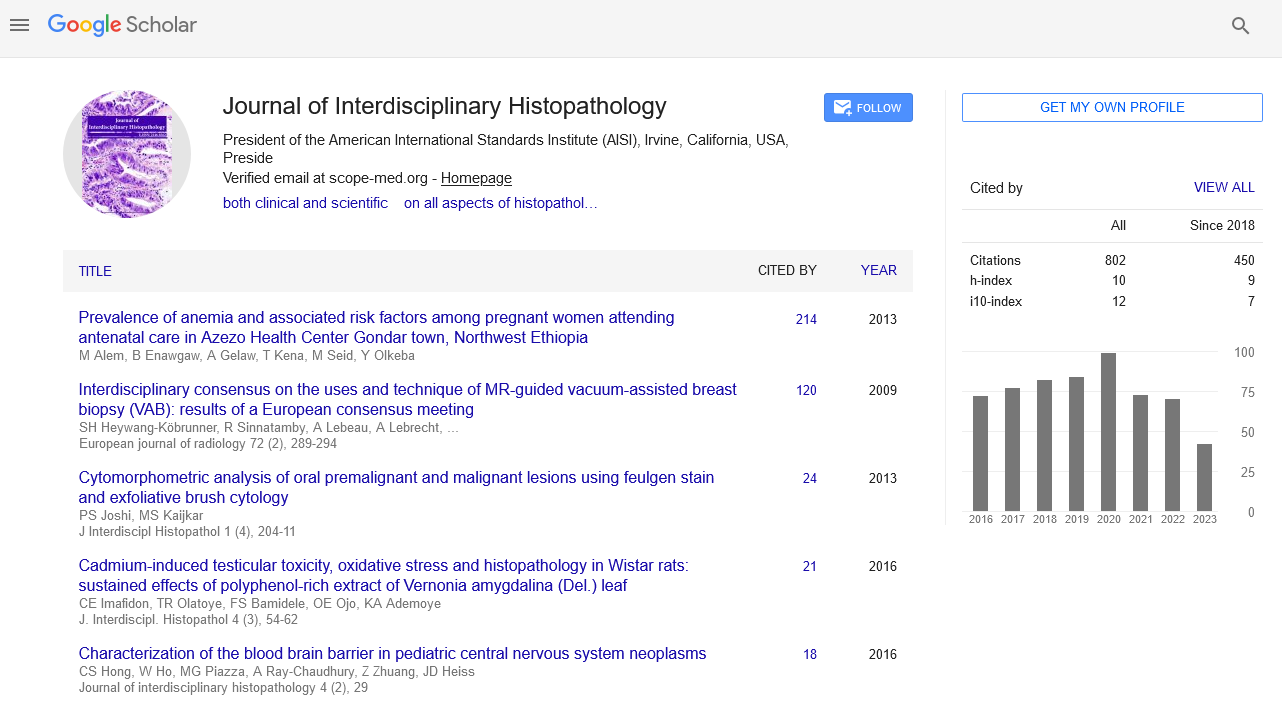Perspective Article - Journal of Interdisciplinary Histopathology (2024)
Decoding Disease Complexity: Investigating Pathogenesis for Precision Medicine
Pavese Manzoni*Pavese Manzoni, Department of Pathology, University of Milan, Milan, Italy, Email: man_pav.378@gmail.com
Received: 26-Jun-2024, Manuscript No. EJMJIH-24-144173 ; Editor assigned: 28-Jun-2024, Pre QC No. EJMJIH-24-144173 (PQ); Reviewed: 12-Jul-2024, QC No. EJMJIH-24-144173 ; Revised: 19-Jul-2024, Manuscript No. EJMJIH-24-144173 (R); Published: 26-Jul-2024
About the Study
Disease pathogenesis is the process by which a disease develops and progresses within the body. It includes the arrangement of occasions, instruments, and components that contribute to the onset, movement, and appearance of a malady. Understanding disease pathogenesis is central for elucidating the underlying mechanisms of disease, identifying potential therapeutic targets, and developing strategies for prevention, diagnosis, and treatment.
Factors influencing disease pathogenesis
The pathogenesis of a disease typically involves multiple interrelated factors, including genetic predisposition, environmental triggers, immune dysregulation, microbial infections, and physiological imbalances. These factors can interact in complex ways to initiate and perpetuate disease processes, leading to the characteristic signs, symptoms, and outcomes associated with a particular condition.
Genetic predisposition
Genetic predisposition plays a significant role in many diseases, influencing an individual’s susceptibility to developing a particular condition. Genetic variants or mutations can alter the structure or function of proteins involved in significant cellular processes, leading to abnormal cellular behaviour’s, dysfunctional pathways, or impaired regulatory mechanisms. For example, mutations in the BRCA1 and BRCA2 genes are associated with an increased risk of breast and ovarian cancer, while mutations in the Cystic Fibrosis Transmembrane conductance Regulator (CFTR) gene cause cystic fibrosis.
Environmental triggers
Environmental triggers, such as toxins, pollutants, infectious agents, and dietary factors, can also contribute to disease pathogenesis by interacting with genetic predisposition and disrupting normal physiological processes. Exposure to environmental toxins, such as cigarette smoke, heavy metals, pesticides, or air pollutants, can induce cellular damage, inflammation, oxidative stress, and DNA mutations, increasing the risk of developing diseases such as cancer, respiratory disorders, or neurodegenerative conditions.
Microbial infections
Microbial infections are another common trigger of disease pathogenesis, particularly in infectious diseases caused by bacteria, viruses, fungi, or parasites. Pathogenic microorganisms can invade host tissues, evade immune defences, and manipulate host cell functions, leading to tissue damage, inflammation, and systemic illness. For example, the Human Immunodeficiency Virus (HIV) targets immune cells, such as Clusters of differentiation 4 (CD4+) T cells, leading to immune suppression and the development of Acquired Immunodeficiency Syndrome (AIDS).
Immune dysregulation
Immune dysregulation is an attribute of many autoimmune and inflammatory diseases, where the immune system mistakenly attacks and damages healthy tissues and organs. Dysfunctional immune responses, such as aberrant activation of immune cells, production of autoantibodies, or dysregulated cytokine signalling, can lead to chronic inflammation, tissue destruction, and organ dysfunction. Autoimmune diseases, such as rheumatoid arthritis, multiple sclerosis, and type 1 diabetes, result from the breakdown of self-tolerance mechanisms and the loss of immune homeostasis.
Physiological imbalances
Physiological imbalances, such as hormonal disturbances, metabolic dysregulation, or disruptions in cellular signalling pathways, can also contribute to disease pathogenesis. Dysfunctional physiological processes can impair tissue function, compromise organ integrity, and disrupt systemic homeostasis, leading to the development of metabolic disorders, endocrine diseases, or neurodegenerative conditions. For example, insulin resistance and dysregulation of glucose metabolism underlie the pathogenesis of type 2 diabetes mellitus.
Complex interplay of factors
The pathogenesis of a disease is often characterized by a complex exchange of genetic, environmental, microbial, immune, and physiological factors, which can vary in their contributions and interactions depending on the specific disease context. Additionally, disease pathogenesis is dynamic and may involve multiple stages or phases, including initiation, progression, and resolution or chronicity.
Advances in biomedical research
Advances in biomedical research, including genomics, proteomics, metabolomics, and systems biology approaches, have enhanced our understanding of disease pathogenesis and identified novel molecular targets and pathways for therapeutic intervention. Targeted therapies, immunomodulatory agents, and precision medicine approaches aim to specifically target the underlying mechanisms driving disease pathogenesis, offering the potential for more effective and personalized treatment strategies.
Disease pathogenesis is a multifaceted process involving genetic, environmental, microbial, immune, and physiological factors that contribute to the development and progression of disease. Understanding the difficulties of these factors is essential for elucidating disease mechanisms, identifying therapeutic targets, and developing strategies for prevention, diagnosis, and treatment. Continued research into disease pathogenesis holds the potential of improving patient outcomes and advancing our ability to combat a wide range of diseases.






